|
|
|
Sort Order |
|
|
|
Items / Page
|
|
|
|
|
|
|
| Srl | Item |
| 1 |
ID:
184995
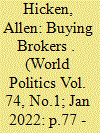

|
|
|
|
|
| Summary/Abstract |
Studies of electoral clientelism—the contingent exchange of material benefits for electoral support—frequently presume the presence of strong parties. Parties facilitate monitoring and enforcement of vote buying and allow brokers to identify core voters for turnout buying. Where money fuels campaigns but elections center around candidates, not parties, how do candidates pitch electoral handouts? The authors analyze candidates’ distribution of cash during an Indonesian election. Drawing upon varied data, including surveys of voters and brokers, candidates’ cash-distribution lists, and focus-group discussions, they find heavy spending but little evidence of vote buying or turnout buying. Instead, candidates buy brokers. With little loyalty or party brand to draw on, candidates seek to establish credibility with well-networked brokers, who then protect their turf with token payments for their own presumed bloc of voters. The authors find little evidence of monitoring of either voter or broker behavior, which is consistent with their argument that these payments are noncontingent.
|
|
|
|
|
|
|
|
|
|
|
|
|
|
|
|
| 2 |
ID:
156423
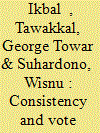

|
|
|
|
|
| Summary/Abstract |
This article examines ambivalence—the simultaneous holding of two or more conflicting values or beliefs about a political issue—among Indonesian citizens’ attitudes about vote buying. Using an original survey taken during the 2014 Indonesian elections, we analyse the factors related both to citizens’ normative views about vote buying and their willingness to accept gifts from candidates. A large number of citizens demonstrate ambivalence by viewing the practice as unjustified or corrupt and yet expressing willingness to accept money from candidates. We also examine the differential effects of education and income on these attitudes. Consistent with “demand side” theories of vote buying, low income creates economic pressure to accept money but does not influence normative attitudes about vote buying. Education, however, has a broader effect by influencing both normative attitudes and willingness to accept money. We consider implications of these results for Indonesian officials focused on reducing vote-buying behavior.
|
|
|
|
|
|
|
|
|
|
|
|
|
|
|
|
| 3 |
ID:
139787
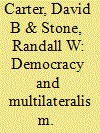

|
|
|
|
|
| Summary/Abstract |
Democracies are more supportive of US positions on important votes in the UN General Assembly than of nondemocracies. Is this because democracies share common perspectives, or does this pattern reflect coercion? Since 1985, US law has stipulated that the US State Department identify important votes and that aid disbursements reflect voting decisions. To unravel these alternative explanations, we introduce a strategic statistical model that allows us to estimate voting preferences, vulnerability to influence, and credibility of linkage, which are theoretical quantities of interest that are not directly observable. The results reject the hypothesis of shared democratic values: poor democracies have voting preferences that are more oppositional to US positions than autocracies, and they are more willing than autocracies to take symbolic stands that may cost them foreign aid. Democracies support US positions, however, because US aid linkages are more credible when directed toward democratic countries. Splitting the sample into Cold War and post–Cold War segments, we find that the end of the Cold War changed the way US linkage strategies treated allies and left- and right-leaning governments, but the effects of democracy remained constant.
|
|
|
|
|
|
|
|
|
|
|
|
|
|
|
|
| 4 |
ID:
171447
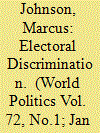

|
|
|
|
|
| Summary/Abstract |
Under what conditions do elections produce racially discriminatory outcomes? This article proposes electoral discrimination as an electoral mechanism for racial marginalization in indigenous and Afro-descendant Latin America. Electoral discrimination occurs when voters are mobilized under differential terms of electoral inclusion based on their observable characteristics. Using the 2010–2014 rounds of the AmericasBarometer and a conjoint experiment, the author finds that skin color is a robust predictor of vote buying across countries in the region with large, visible black and indigenous populations. A significant portion of the relationship between skin color and vote buying is due to the disproportionate impacts of race-neutral targeting criteria on dark-skinned voters. Observed differences in wealth, political and civic engagement, partisanship, political interest, interpersonal trust, and geography together explain a portion of the skin color–client gap, although the individual contribution of each of these factors differs by country. In addition, the author finds an independent relationship between skin color and vote buying over and above these race-neutral factors. The argument and findings in this article speak broadly to the consequences of electoral mobilization in ethnoracially stratified states in Latin America and beyond.
|
|
|
|
|
|
|
|
|
|
|
|
|
|
|
|
| 5 |
ID:
178722
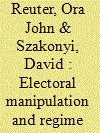

|
|
|
|
|
| Summary/Abstract |
Does electoral fraud stabilize authoritarian rule or undermine it? The answer to this question rests in part on how voters evaluate regime candidates who engage in fraud. Using a survey experiment conducted after the 2016 elections in Russia, the authors find that voters withdraw their support from ruling party candidates who commit electoral fraud. This effect is especially large among strong supporters of the regime. Core regime supporters are more likely to have ex ante beliefs that elections are free and fair. Revealing that fraud has occurred significantly reduces their propensity to support the regime. The authors’ findings illustrate that fraud is costly for autocrats not just because it may ignite protest, but also because it can undermine the regime’s core base of electoral support. Because many of its strongest supporters expect free and fair elections, the regime has strong incentives to conceal or otherwise limit its use of electoral fraud.
|
|
|
|
|
|
|
|
|
|
|
|
|
|
|
|
| 6 |
ID:
158205
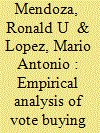

|
|
|
|
|
| Summary/Abstract |
Recent literature suggests that the poor are more likely to be targeted for vote buying and to sell their votes. However, there is limited empirical analysis on the patterns of vote buying among low-income voters. This paper attempts to fill this gap using a survey conducted in Metro Manila, Philippines after the 2016 elections. Data analysis shows that vote buying among the poor is indeed very common, but the incidence varies depending on the vote buying type. The most prevalent form uses more benign goods such as food and clothing, but offers of money is still reported by more than a quarter of respondents. Different vote-buying types also have different correlates, including some socio-economic factors, suggesting that it is a finely targeted activity. In addition, money vote buying is predominant in tight elections, but buying votes using non-monetary offers is more common when there is a clear winner even before the election. Most of those who were offered accepted the goods or money, but only about two-thirds voted for the candidate. In addition, evidence suggests that the good or money is not the deciding factor in voting for the candidate. This supports the premise that vote buying is just part of a bigger effort by politicians to build clientelism and patronage among his/her constituencies. Dependency and loyalty is merely punctuated by election-related transfers, rather than an effort to completely change votes.
|
|
|
|
|
|
|
|
|
|
|
|
|
|
|
|
| 7 |
ID:
180258
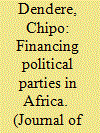

|
|
|
|
|
| Summary/Abstract |
What is the impact of access to political party finance – money that parties use to fund their campaign activities – on politics in Africa? While multiparty elections have become more regular in the developing world, many opposition parties are still failing to win elections. This paper argues that poor access to political finance weakens democratic consolidation and negatively impacts the participation of less-resourced candidates who are unable to self-fund. As a result, opposition parties are forced to rely on weak promises of aid from international donors and unreliable state funding. This in-depth analysis of political finance, based on extensive interviews with politicians and government officials in Zimbabwe, political documents, news reports and a review of court cases, reveals that uneven financing has weakened opposition parties and serves as an extra advantage for incumbents.
|
|
|
|
|
|
|
|
|
|
|
|
|
|
|
|
| 8 |
ID:
149173
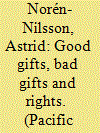

|
|
|
|
|
| Summary/Abstract |
In the Cambodian national elections in 2013, the opposition Cambodia National Rescue Party (CNRP) experienced a strong surge in support, finishing a close second to the long-incumbent Cambodian People’s Party (CPP). Whilst the CNRP campaigned on an anti-money politics, rights-based agenda, the CPP has relied on gift-giving practices to maintain links with voters. This article explores changing popular conceptions of issue_images_89_4_nilsson_cambodia-election-perceptions-ea-image02-jpgprovision to assess to what extent a democratic, rights-based conscience in Cambodia has emerged under the current neo-patrimonial regime. Building on qualitative interviews with 192 voters in post-election Cambodia, it finds that gift-giving practices play a different role than current academic theorizations of popular politics, and Cambodian popular politics in particular, would lead us to expect. Ordinary Cambodians are found to make a distinction between contingent and non-contingent exchanges in electoral mobilization, rejecting the former and embracing the latter. CPP gift giving in its current guise is consequently devoid of popular legitimacy across the political camps. At the same time, the idea of meritorious gift giving lives on as an ideal, especially among CNRP supporters.
|
|
|
|
|
|
|
|
|
|
|
|
|
|
|
|
| 9 |
ID:
167290
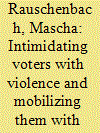

|
|
|
|
|
| Summary/Abstract |
Recent research suggests that intimidating voters and electoral clientelism are two strategies on the menu of manipulation, often used in conjunction. We do not know much, however, about who is targeted with which of these illicit electoral strategies. This article devises and tests a theoretical argument on the targeting of clientelism and intimidation across different voters. We argue that in contexts where violence can be used to influence elections, parties may choose to demobilize swing and opposition voters, which frees up resources to mobilize their likely supporters with clientelism. While past research on this subject has either been purely theoretical or confined to single country studies, we offer a first systematic cross-national and multilevel analysis of clientelism and voter intimidation in seven African countries. We analyze which voters most fear being intimidated with violence and which get targeted with clientelistic benefits, combining new regional-level election data with Afrobarometer survey data. In a multilevel analysis, we model the likelihood of voters being targeted with either strategy as a function of both past election results of the region they live in and their partisan status. We find that voters living in incumbent strongholds are most likely to report having being bribed in elections, whereas those living in opposition strongholds are most fearful of violent intimidation. We further provide suggestive evidence of a difference between incumbent supporters and other voters. We find support that incumbent supporters are more likely to report being targeted with clientelism, and mixed support for the idea that they are less fearful of intimidation. Our findings allow us to define potential hot spots of intimidation. They also provide an explanation for why parties in young democracies concentrate more positive inducements on their own supporters than the swing voter model of campaigning would lead us to expect.
|
|
|
|
|
|
|
|
|
|
|
|
|
|
|
|
| 10 |
ID:
160634
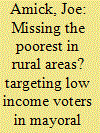

|
|
|
|
|
| Summary/Abstract |
This article utilizes an original household survey of two regency-level elections in Indonesia to explore campaign targeting. It uses a list experiment to show that direct survey questions about accepting transfers from campaigns elicit honest responses from respondents in Indonesia. Although the relationship between income and whether a respondent accepted transfers from political campaigns decreases over the entire distribution of income, it increases initially, producing a curvilinear relationship between income and accepting transfers from campaigns. This article argues that the poorest voters face barriers to being targeted by campaigns. However, these barriers recede as they become relatively richer, at which point a negative relationship is found due to diminishing marginal utility of accepting these transfers. Finally, in-kind transfers, as opposed to cash transfers, target low-income voters more effectively.
|
|
|
|
|
|
|
|
|
|
|
|
|
|
|
|
| 11 |
ID:
175412
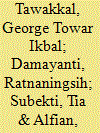

|
|
|
|
|
| Summary/Abstract |
This manuscript examines the role of intermediaries known as “brokers” in mobilizing voters, often by distributing cash and material goods, for campaigns in Indonesia. We build upon previous studies by examining the role of social networks in recruiting brokers into campaigns, the structure of brokerage networks, and the motivations of brokers to join a campaign. Whereas past studies tend to view the candidate-broker relationship in transactional terms, our study finds that the social network of candidates is also an important factor that helps explain how brokerage networks are structured and also the considerations that motivate brokers to work for a campaign. While material benefits and transactional considerations do motivate some brokers, we also find a wide variety of solidary benefits such as personal friendships and shared membership in social organizations as motivating factors for many other brokers. Our findings are based on in-depth interviews with approximately 150 individuals (candidates, brokers, citizens, etc.) during the 2017–2019 series of Indonesian elections which includes local village head elections, legislative elections, and the gubernatorial election.
|
|
|
|
|
|
|
|
|
|
|
|
|
|
|
|
| 12 |
ID:
158038
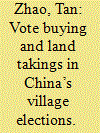

|
|
|
|
|
| Summary/Abstract |
Why has vote buying spread so rapidly in China’s village elections in recent years? Based on fieldwork conducted in 14 villages of Shandong Province, this article argues that candidates pursue vote buying when they perceive large potential economic rents associated with the village leader’s power. While such rents were relatively limited in the past, the introduction of land takings in rural areas has significantly changed this situation and sharply increased potential rents for candidates, thus providing them with stronger incentives to pursue vote buying. In other words, this article associates vote buying with rent seeking in China’s village elections.
|
|
|
|
|
|
|
|
|
|
|
|
|
|
|
|
| 13 |
ID:
159178
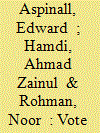

|
|
|
|
|
| Summary/Abstract |
What underlying logic explains candidate participation in vote buying, given that clientelist exchange is so difficult to enforce? We address this question through close analysis of campaigns by several dozen candidates in two electoral districts in Java, Indonesia. Analyzing candidates’ targeting and pricing strategies, we show that candidates used personal brokerage structures that drew on social networks to identify voters and deliver payments to them. But these candidates achieved vote totals averaging about one quarter of the number of payments they distributed. Many candidates claimed to be targeting loyalists, suggestive of “turnout buying,” but judged loyalty in personal rather than partisan terms, and extended their vote-buying reach through personal connections mediated by brokers. Candidates were market sensitive, paying prices per vote determined not only by personal resources, but also by constituency size and prices offered by competitors. Accordingly, we argue that a market logic structures Indonesia's system of vote buying.
|
|
|
|
|
|
|
|
|
|
|
|
|
|
|
|
| 14 |
ID:
120589
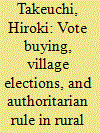

|
|
|
|
|
| Publication |
2013.
|
| Summary/Abstract |
Village elections are a democratic institution in one of the most resilient authoritarian regimes in the world. The Chinese Communist Party (CCP) has promoted village elections over the past twenty years, but not elections at higher levels. I present a game-theoretic model in which candidates would engage in vote buying when competing in a small electorate but not when competing in a larger electorate. The model's equilibrium outcome implies that the logic of China's introduction of village elections inherently limits this democratic reform to the grassroots level. Elections for higher levels of government would be dangerous to the regime because they would lead candidates to create substantive policy platforms and political organizations. Thus, rather than being an experiment that has failed to lead to further reforms, village democracy is self-limiting by design.
|
|
|
|
|
|
|
|
|
|
|
|
|
|
|
|
| 15 |
ID:
165224
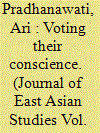

|
|
|
|
|
| Summary/Abstract |
When citizens are offered cash and gifts by candidates, they can either vote for candidates offering the money, refuse the money, or take the money and vote for whichever candidate they prefer (e.g., “vote their conscience”). Which citizens “vote their conscience” versus the other options available to them? This manuscript examines the effect of poverty, education, and social pressure on how citizens in the Central Java city of Semarang, Indonesia react to offers of cash from politicians. We find that poverty and education interact to create important and interesting patterns of responses. The citizens most likely to “vote their conscience” are those with lower income yet higher levels of formal education whereas higher income, more highly educated citizens are most likely to refuse the money. We also examine factors that create social pressure for citizens to “sell” their votes by supporting the candidates offering cash.
|
|
|
|
|
|
|
|
|
|
|
|
|
|
|
|
|
|
|
|
|